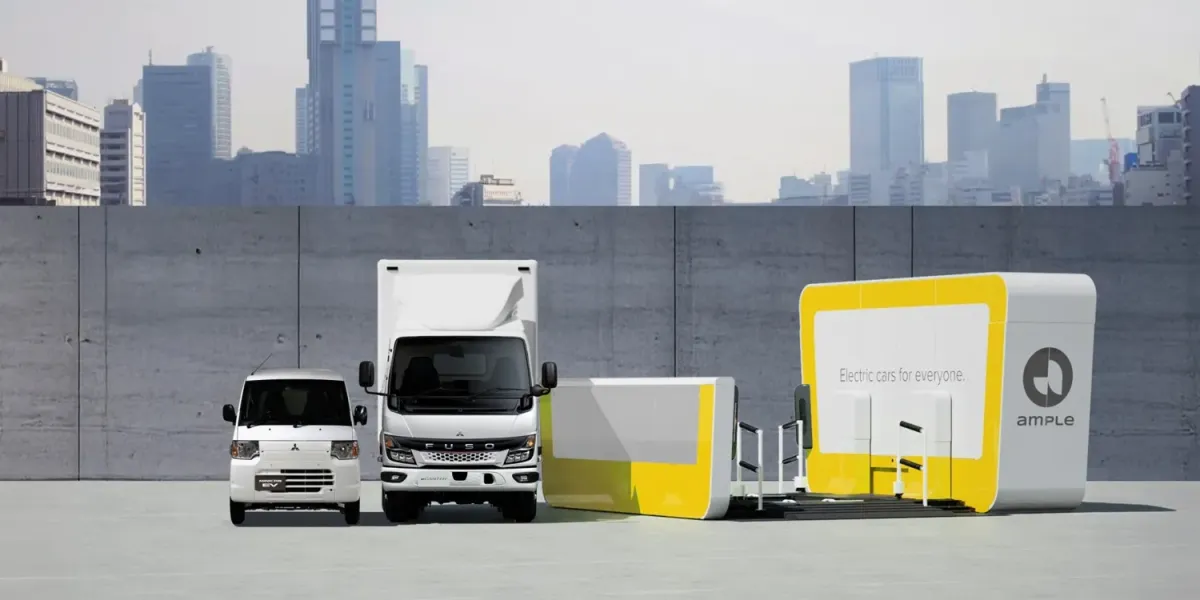Mitsubishi Motors has unveiled an ambitious electric vehicle battery swap network in Tokyo, marking a significant milestone in the evolution of EV infrastructure. Unlike traditional charging stations, this innovative system allows drivers to exchange depleted batteries for fully charged ones in minutes, addressing one of the biggest barriers to EV adoption: charging time anxiety.
Revolutionary Technology Meets Urban Mobility Needs
The Japanese automaker's battery swap network represents a paradigm shift in how we think about electric vehicle refueling. While most manufacturers have focused on faster charging technologies, Mitsubishi has taken a different approach by creating a system that eliminates waiting time entirely.
The network features automated battery swap stations that can service both passenger cars and commercial trucks, making it the first comprehensive swap system to address the diverse needs of urban transportation. The process takes approximately 3-5 minutes per vehicle, comparable to traditional gasoline refueling times.
How the Battery Swap System Works
The technology behind Mitsubishi's network is both sophisticated and elegantly simple. Vehicles drive into designated swap bays where robotic systems automatically remove the depleted battery pack and install a fully charged replacement. The entire process is monitored by advanced sensors and AI systems to ensure safety and precision.
Key features of the system include:
- Automated robotic battery handling
- Real-time battery health monitoring
- Standardized battery pack design across vehicle types
- Mobile app integration for reservation and payment
- 24/7 operation capability
Addressing Commercial Fleet Challenges
One of the most significant aspects of Mitsubishi's initiative is its inclusion of commercial trucks and delivery vehicles. Fleet operators have been hesitant to adopt electric vehicles due to concerns about downtime during charging, which directly impacts productivity and profitability.
The battery swap network addresses these concerns by:
- Minimizing vehicle downtime to under 5 minutes
- Enabling continuous operation for delivery fleets
- Reducing the need for large battery inventories
- Providing predictable operational costs
Early pilot programs with Tokyo-based logistics companies have shown promising results, with some operators reporting up to 20% improvement in daily delivery capacity compared to traditional charging methods.
Strategic Expansion Plans
Mitsubishi's initial rollout includes 12 swap stations strategically located across Tokyo's major commercial districts and transportation hubs. The company plans to expand to 50 stations within the metropolitan area by 2025, with additional networks planned for Osaka and Nagoya.
The expansion strategy focuses on high-traffic corridors and areas with significant commercial vehicle activity. Each station is designed to handle up to 200 battery swaps per day, with the capacity to serve both individual consumers and fleet operators.
Industry Impact and Market Response
The launch has generated significant interest from other automakers and infrastructure companies. Industry analysts suggest that successful implementation could accelerate similar projects globally, particularly in densely populated urban areas where space for charging infrastructure is limited.
Several major Japanese corporations have already expressed interest in partnering with Mitsubishi for fleet electrification, including e-commerce giants and logistics companies facing increasing pressure to reduce carbon emissions.
Challenges and Future Outlook
Despite the promising start, the battery swap model faces several challenges. Standardization across different vehicle manufacturers remains a significant hurdle, as does the substantial upfront investment required for infrastructure development.
However, Mitsubishi's approach of creating a unified platform for both passenger and commercial vehicles could provide the scale necessary to make the economics work. The company has invested over $200 million in the initial Tokyo network and is seeking additional partners to support expansion.
Transforming Urban Transportation
Mitsubishi's battery swap network represents more than just a technological innovation—it's a comprehensive solution to urban mobility challenges. By addressing the time constraints that have limited EV adoption, particularly in commercial applications, this initiative could accelerate the transition to electric transportation in one of the world's largest metropolitan areas.
The success of Tokyo's network will likely influence similar projects worldwide, potentially establishing battery swapping as a viable alternative to traditional charging infrastructure. For urban planners, fleet operators, and environmental advocates, Mitsubishi's bold experiment offers a glimpse into a more sustainable and efficient future for city transportation.
